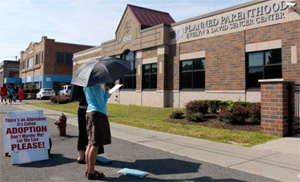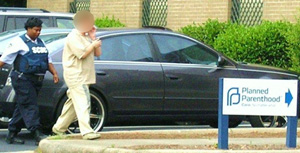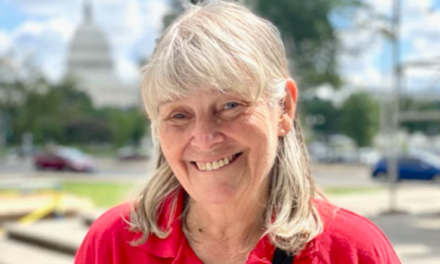Heller also admits as an abortionist he suffered from depression and alcoholism
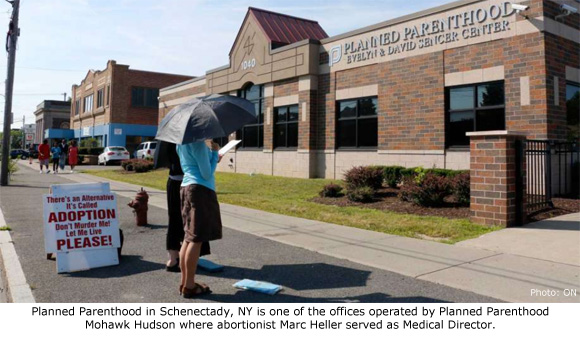
By Cheryl Sullenger
Cooperstown, NY – As Planned Parenthood Mohawk Hudson relocates into their new $2 million office in Queensbury, New York, today, an interview of their former Medical Director sheds light on Planned Parenthood practices that place the lives of women at risk.
Marc Elliot Heller worked until very recently as Medical Director for Planned Parenthood Mohawk Hudson, Inc. at abortion facilities in Utica and Schenectady, New York. On November 19, 2016, a student from the Cooperstown Graduate Program, State University of New York-College at Oneonta interviewed Heller about his work conducting abortions.
During that interview, Heller discussed abortion complications that required emergency hospitalization. While he (unconvincingly) downplayed the number of times his staff would have to call an ambulance for an abortion patient, he admitted that he ordered his staff to request that ambulances run silently and go to the back door in order to avoid bad publicity.
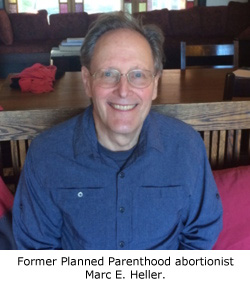 Heller said during the interview:
Heller said during the interview:
Even if people didn’t like abortion, they would take care of my patient’s medical problems. There [at Planned Parenthood], it was always like you never knew. The transfers were very rare, but we always said to the ambulance, “Please come to the back entrance. Please don’t use any sirens or lights,” because we knew that the protestors that were there every day would call the press. And there would be a press thing about “another botched abortion.” So we went quietly out and then I drove along and sat there until either they were admitted to the hospital, which only happened a couple times, or they were discharged. I tried to be quiet and nice to people. Sometimes they were nice and sometimes they weren’t, but I was an outsider and I think being an outsider was characteristic of all doctors who performed abortions across this entire country. You lose your colleagues.
“It is obvious that this dangerous practice is still going on today at Planned Parenthood and other abortion facilities, even though it means that response times will be slower,” said Operation Rescue President Troy Newman. “It really confirms that Planned Parenthood’s public relations are more important to them than the lives of women.”
Heller discussed an incident where one of his patients nearly died.
“There was a patient who had a complication—a serious one—and was saying to me ‘Dr. Heller, please don’t let me die. Am I gonna die?’ and we had to send her to the Intensive Care Unit.”
Heller also revealed that when he was trying to establish his own abortion clinic within a hospital setting prior to his employment with Planned Parenthood, he rewrote the bylaws in order to avoid having to submit aborted baby remains to a pathologist for examination, which could confirm whether or not an abortion was complete. Heller explained in the interview that he did it to save money.
There was a rule that all surgical specimens had to go to pathology, which would have cost 150 dollars in itself. So I quietly had to have the medical staff bylaws changed, which I wasn’t sure was going to go through. [I changed the bylaws] to say “dermatologic skin tissues and abortion”—I don’t know how we phrased it—“didn’t have to go.”
Heller described his feelings of isolation and ostracism as he moved from a hospital environment to Planned Parenthood’s outpatient abortion facilities.
When I decided to leave the hospital and be medical director, I became professionally completely isolated. There was no other doctor around when I worked mainly in Utica and Schenectady. There were virtually no sympathetic doctors in Utica and there was one in Schenectady, but I didn’t see them. At the hospital here there was a whole cadre of specialists and sub-specialists so that if there were medical problems I could turn to them. I could see my colleagues every day. One never knew at the clinic how one would be received when one called the patient’s primary doctor or specialist if they had a medical problem. So it was always sort of like a deep breath; give them a call. Some were fine. Some weren’t that nice at all.
Heller also described his struggles with depression and alcoholism while working for Planned Parenthood. Heller tries to downplay the seriousness of his mental health issues and alcohol abuse, as substance abusers are known to do. However, throughout the interview, Heller purposely attempted to make himself look good while wrongly depicting pro-live advocates as “violent.”
It was two months before my daughter was born. I had had all kinds of treatment. I had had individual psychotherapy, group psychotherapy, marital therapy and some psychoanalysis because I had a lot of emotional problems, which is why we didn’t have kids for such a long time. But two months before my daughter was born I really realized that I didn’t want to be a parent and drink. I don’t know. It was a gift. It was not so much difficult not to drink, but difficult in overcoming the shame of being a doctor that drank. It wasn’t complicated. I just didn’t drink and I went to AA [Alcoholics Anonymous] for twelve years. I just made that decision. I guess that’s the story of that. It wasn’t that complicated really. What it did for me was, besides it was a difficult thing, it also helped me to join the human race in a way that I never could have before.
Ironically, Heller credits his pre-born daughter for giving him the strength to stop drinking.
I didn’t drink at work. I drank at night to be able to sleep, because I think it was a treatment for my depression and not a good one, but it was what I used to sort of manage it. I used to get panic and anxiety attacks. [Laughter] When patients came with those, there were colleagues who said, “Oh they’re just crazy.” I was always very comfortable with the crazy patients, because I had known horrible that feeling is; afraid you’re gonna live, afraid you’re gonna die. It’s hard to say. I think I was less crabby. I rarely drank large quantities, but I drank enough pretty much every night to sleep, but it still makes you crabby the next day. . . I was lucky. I was really lucky. It was because of my daughter. She’s the one; I think her spirit came to me before she was born somehow and gave me that gift.
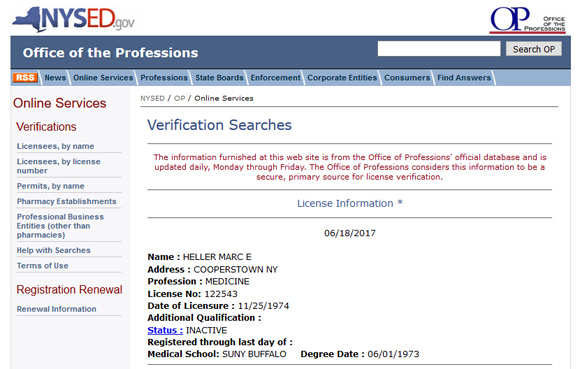
Heller claims to have done over 14,000 abortions during his career. It is hard not to wonder what “gifts” those 14,000 human beings might have been to their family and communities, had it not been Marc Heller.
Thankfully, Heller’s New York medical license profile now lists his license as “Inactive.”
“Here is a man who admits he worked for years at Planned Parenthood abortion facilities while suffering from unresolved serious mental disorders and alcoholism. His story typifies what we find over and over inside the Abortion Cartel,” said Newman. “There are abortionists with similar problems that are still working every day at abortion facilities around the country. They hide their problems from medical boards and from their patients. It doesn’t matter how new a building is or how much Planned Parenthood paid for it, because their abortionists, like Marc Heller, still pose a very serious invisible danger to women everyday.”
Read the full interview transcript.

